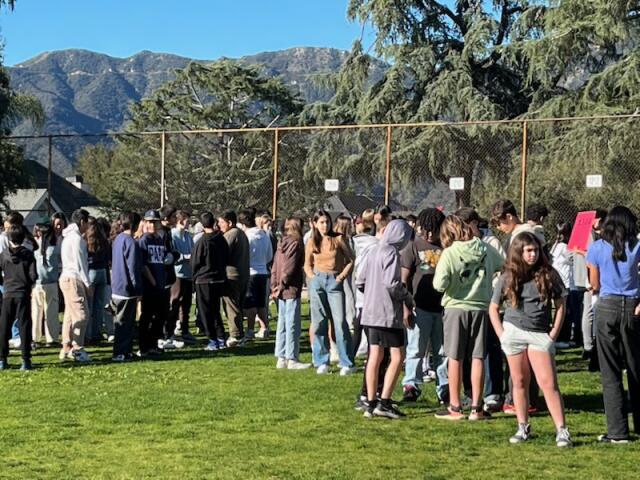Here at Rosemont Middle School, throughout February, we have been celebrating Black History Month. Ms. Risse has been talking about an African-American person in history every day on the morning announcements. Usually, we learn about a famous Black person who contributed greatly to the world, but there are so many more average, everyday people who deserve to be recognized. On Wednesday, January 31, California became the first state in the U.S. to announce a set of reparation bills that are meant to give Black Americans who have been hurt by systemic racism restitution and deconstruct the legacy of slavery. The fourteen bills introduced by the California Legislative Black Caucus, or CLBC, “Tackles a wide range of issues; from criminal justice reforms to property rights to education, civil rights and food justice. The Caucus is looking to make strides in the second half of this legislative session as we build towards righting the wrongs of California’s past in future sessions,” as stated by Assemblywoman Lori Wilson, the chair of the CLBC. According to Dictionary.com, a reparation is “something done or given to make amends.”
Last summer, the Reparations Task Force, a non-regulatory state agency established in 2020 to develop reparation proposals for African Americans, specifically descendants of slaves from the United States, released its final report to the California Legislature. According to the State of California Department of Justice, “The final report surveys the ongoing and compounding harms experienced by African Americans as a result of slavery and its lingering effects on American society today, and proposes a comprehensive reparations plan in satisfaction of the direction set forth by the Legislature in…2020”. In short, this 1,100-page report explains how California is contributing in preserving racism against Black residents indefinitely, and recommends ideas for repairing the harm done.
For about seven months, citizens have been waiting in anticipation to discover what would happen with this report, but, as expected, an abundant amount of controversy has surrounded it. On Monday, May 1, 2021, the task force published documents considering making individual cash payments to descendants of enslaved African Americans, which most California voters were against. A poll conducted by the University of California, Berkeley, concluded that 59% of over 6,000 voters opposed the idea of cash reparations, while thirteen percent had no opinion at all. This indicates that only 23% of voters supported the suggestion. Republicans almost unanimously opposed it, while Democrats were evenly split. Additionally, it was found that the only racial group to support the payments by a majority was Black voters. There is also much debate on who is eligible for these payments if they were to happen. “Is it anybody who has any connection with slavery, or is it just people who have connections to California slavery? Even though California was technically a free state, there were still people who found a way to have slaves in California. Whether people will accept this or not, a lot of it will depend on how many people are actually eligible for these cash payments,” states eighth-grade history teacher, Mr. Anker. However, despite all of the debates and controversy, when the reparation bills were introduced to the California Legislature, financial compensation was notably absent from the package. “While many only associate direct cash payments with reparations, the true meaning of the word, to repair, involves much more. As laid out in the report, we need a comprehensive approach to dismantling the legacy of slavery and systemic racism,” declared Lori Wilson.
For those wondering if reparations will truly fix some of the wrongs caused by centuries of systemic racism in California, a possible answer may lie in an example from early 2023, in a place in Manhattan Beach, California, called Bruce’s Beach. In 1912, Charles and Willa Bruce purchased two lots by the sand, running an inn, and were followed by more Black families who bought cottages by the beach, in a neighborhood that became known as Bruce’s Beach. However, white neighbors did not want them to be there, and got the city to seize the properties in 1924, saying they needed a park. “Basically,” says Mr. Anker, “they were forced to give up their land because they were Black. So, it was clearly wrong, and that was a long time ago, but those people’s families still live in Southern California, and … if they had been able to keep that property they would be very wealthy, and that wealth was denied.” Thankfully, in June 2022, the LA County Board of Supervisors approved a plan to return Bruce’s Beach to Charles and Willa’s descendants, and sold it back to LA County for $20 million. “It was an obvious wrong, these are the obvious descendants, these are the obvious people who were affected, here’s the exact dollar amount cause we know exactly how the land is worth, and so you can’t really say that was wrong. It’s very obvious,” adds Mr. Anker.
These bills must still go through the legislative process, and it will most likely take a very long time for them to reach California Governor Gavin Newson. Many will most likely be vetoed, and few will become law. However, the introduction of this package marks a huge milestone in the road of righting wrongs caused by slavery and systemic racism in California and the US, and it is hoped that the other 49 states will follow California’s lead.
California Reparation Bills
Story continues below advertisement
Donate to The Spartan Scroll
$0
$1500
Contributed
Our Goal
Your donation will support the student journalists of Rosemont Middle School. Your contribution will allow us to purchase equipment and cover our annual website costs.
Navigate Left
-
Arts & EntertainmentComing Soon
-
Arts & EntertainmentThe musical master behind Tim Burton's films
-
Arts & Entertainmentvenom the last dance
-
Arts & EntertainmentWinter Break
-
 Arts & EntertainmentTyler, the Creator Chromakopia Album
Arts & EntertainmentTyler, the Creator Chromakopia Album -
Arts & EntertainmentK-pop comes to Rosemont
-
 Arts & EntertainmentWicked, a worthy musical
Arts & EntertainmentWicked, a worthy musical -
Arts & EntertainmentSushi Showdown
-
Arts & EntertainmentNewest music headines
-
 Arts & EntertainmentTrending Halloween Costumes for 2024
Arts & EntertainmentTrending Halloween Costumes for 2024
Navigate Right
About the Contributor

Josephine Gaudioso, Senior Arts and Culture Editor
Josephine (Jojo) Gaudioso is thirteen years old and grew up in La Crescenta, where she attended Franklin Elementary School and learned Italian for seven years. She lives with her parents and two siblings and likes to read and write fantasy stories. She also plays piano and guitar and enjoys listening to music from the 80s and 90s. Jojo is an eighth grader at Rosemont and a Senior Arts and Culture Editor for the Spartan Scroll. When she grows up she wants to be an author and have at least two pets.











